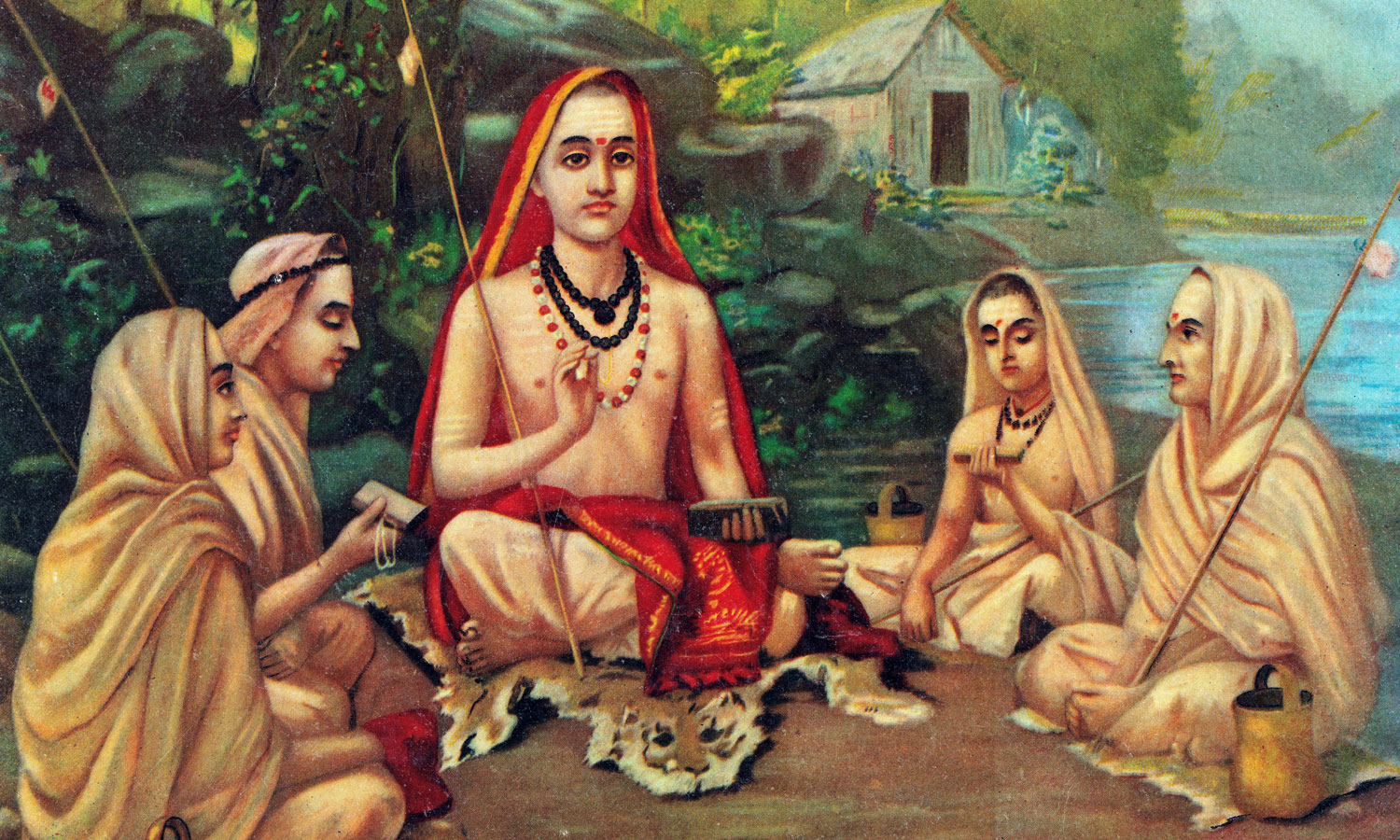Painting. Raja Ravi Varma
Early Life and Spiritual Quest
On the banks of the Kaveri River in the ancient Chola kingdom lived a devout Brahmana named Vimala, who was blessed with a remarkable son. While still in his teens, this young man mastered the Vedas and showed a distinct aversion to worldly life. His heart yearned for a spiritual guide who could help him transcend the cycle of worldly existence (samsara). Refusing marriage, he embarked on a journey with the sole purpose of finding such a Guru.
Meeting with Sri Shankara
His spiritual quest led him to Kashi (Varanasi), where Sri Shankaracharya was residing at the time, expounding His profound Bhashyas (commentaries). The young seeker, radiant with spiritual brilliance (Brahma-Tejas), rushed to Sri Shankaracharya and prostrated at His feet. Recognizing the aspirant's exceptional learning, courage, and earnestness, Sri Shankaracharya accepted him as a disciple, initiating him into Sannyasa and giving him the name Sanandana.
The First Among Disciples
Sri Sanandana quickly distinguished himself as the foremost among Sri Shankara's disciples—not just chronologically, but in several other aspects. His unparalleled devotion so pleased the Acharya that he took the extraordinary effort of explaining his works to Sanandana three times. This special attention created some reservations among the other disciples, which Sri Shankara decided to address promptly.
The Miracle of Lotus Footsteps
On one occasion, Sanandana and several other disciples were on one bank of the Ganges while Sri Shankara was on the opposite shore. The Acharya called them to join him, but no boat was available. Undeterred and secure in his faith, Sanandana stepped onto the water and began walking across.
Moved by his extraordinary devotion, the divine Ganga manifested lotuses upon the water, supporting his feet with each step. To everyone's amazement, he calmly crossed the river to reach Sri Shankara, who embraced him warmly—a mark of affection and honor no other disciple had received. From that day forward, at Sri Shankara's wish, he became known as Padmapada ("lotus-footed").
Scholarly Brilliance and Spiritual Depth
Even before becoming Sri Shankara's disciple, Padmapada had been central to the world of Vedic scholarship of his time. However, what truly defined his greatness was not merely his scholarship, but the challenges he faced, his choice of generosity and atonement, and the profound understanding he demonstrated.
Saving the Acharya's Life
A famous incident illustrates Padmapada's devotion to his Guru. Once, a Kapalika (a practitioner of extreme tantric rituals) who worshipped Bhairava approached Sri Shankara with a request to offer His head as a sacrificial offering to Bhairava. Sri Shankara, who had transcended identification with His physical body and lived in complete surrender to Divine Will, willingly consented. He further cautioned the Kapalika to take his head without the knowledge of His disciples, particularly Padmapada.
When all the disciples had gone to bathe in the river, the Kapalika approached Sri Shankara, who was immersed in Samadhi. As the Kapalika raised his sword to strike, Padmapada intuitively sensed the danger. Through the power of his meditation on Lord Narasimha, Padmapada manifested the divine form of the Lord himself. He pounced upon the Kapalika, tore him to pieces, and let out a thunderous roar of triumph.
The other disciples rushed to the scene as Sri Shankara emerged from his Samadhi. Everyone, including the Acharya, was astonished. With great difficulty, Sri Shankara helped Padmapada return to his normal form. To everyone's surprise, they learned that in his life before becoming a monk (Poorvashrama), Padmapada had been a devoted worshipper of Lord Narasimha, performing intense penance at Ahobila hills.
The Hunter and Lord Narasimha
Padmapada shared another remarkable incident from his earlier life. While meditating in the forest, he encountered a hunter who asked what he was doing there. When Padmapada replied that he was seeking Lord Narasimha, the hunter—claiming to know every corner of the forest—insisted that no such being existed there.
Padmapada maintained that Narasimha did exist and described in detail the man-lion form of the Lord. The hunter then promised to produce this man-lion the very next day before sunset.
After searching extensively without success, the hunter, true to his word, resolved to end his life when he couldn't fulfill his promise. Pleased by the hunter's extraordinary dedication, Lord Narasimha appeared before him. The hunter immediately threw a rope around the Lord's neck and brought Him to Padmapada.
Astonished, Padmapada asked the Lord how He had allowed Himself to be captured in such a manner. Lord Narasimha replied that even Brahma, the creator, had not shown the same earnestness in contemplation as this illiterate hunter had demonstrated.



